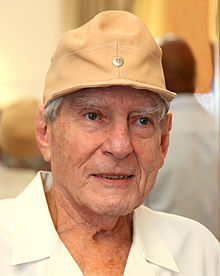France-Albert René
| France-Albert René | |
|---|---|
 |
|
| 2nd President of Seychelles | |
|
In office 5 June 1977 – 14 April 2004 |
|
| Vice President |
James Michel (1996–2004) |
| Preceded by | James Mancham |
| Succeeded by | James Michel |
| 2nd Prime Minister of Seychelles | |
|
In office 1976–1977 |
|
| President | James Mancham |
| Preceded by | James Mancham |
| Succeeded by | office abolished |
| Personal details | |
| Born |
16 November 1935 Victoria, Seychelles |
| Political party | Seychelles People's Progressive Front |
| Spouse(s) | Karen Handley (1950s) Geva Adam (1975) Sarah Zarquani (1993) |
| Alma mater | King's College London |
| Profession | Lawyer, politician |
France-Albert René (French pronunciation: [fʁɑ̃salbɛʁ ʁəne]; born 16 November 1935) was the long-time socialist President of Seychelles from 1977 to 2004. He is known by government officials and party members as "the Boss". His name is often given as simply Albert René or F.A. René; he is also nicknamed Ti France.
During the many years of his Presidency, René was a well-loved and respected national figure. He managed to turn Seychelles from a poverty-stricken, least developed country to a middle income well-governed state, with universal health coverage and a literacy rate over 90%.
He is also credited with having provided robust on-the-job political-training to all the politicians in his camp.
René was educated at St Mary's College in Southampton, England, and at King's College London before serving as a lawyer in Seychelles from 1957 to 1961. While abroad, he became heavily involved in the politics of the Labour Party, at the time led by Clement Attlee and later Hugh Gaitskell. These experiences led him to adopt a moderate socialist ideology that favoured some state intervention in the economy and strong ties with conservative forces such as the Roman Catholic Church (René's initial career goal was to join the priesthood). Later Rene denounced local church leaders who criticised his policies. He formed the Seychelles People's United Party (the forerunner to today's Seychelles People's Party) in 1964.
In 1976, he became the country's prime minister under President James Mancham following assembly elections which the SPUP came in second place. On 5 June 1977, partisan supporters of René installed him as president in a coup d'état. After coming to power, René declared that he was not a Soviet-style Communist, but rather an "Indian Ocean socialist." Early on he opposed the Anglo-American military installation on the nearby island of Diego Garcia because of the possible storage of nuclear weapons and alleged detention of terrorist suspects at that location.
...
Wikipedia
